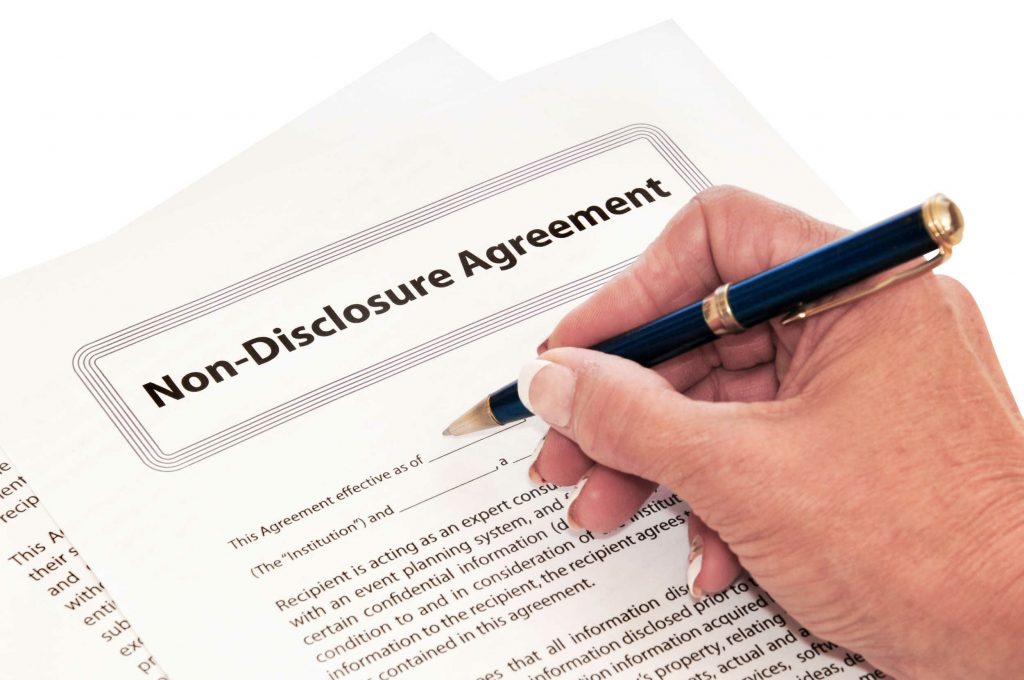
For maintaining a competitive edge in the market, businesses need to keep innovating. They must continue working on new projects, services, and products to best deal with the pressure against their competitors. It applies to different aspects of a business, such as finance, corporate transactions, negotiations, employment agreements, technologies, to name a few. A Non-Disclosure Agreement (abbreviated as NDA) is a legal document signed to safeguard the previously-mentioned sensitive information. In legal terms, it is a contract signed amongst at least two parties looking forward to detailing confidential knowledge, clauses, statements, or any information they wish to restrict from access by third parties. In a commercial application, this confidential information is generally referred to as Intellectual Property (IP), whereas the term may be used to refer to other sensitive information in the scenario of doctor-patient confidentiality, priest-penitent privilege, attorney-client privilege, and bank-client confidentiality. In this article, we will focus and analyze only the commercial application of an NDA by understanding how it could be used to protect a business and its IP assets.

Understanding the Relevance of an NDA
In the present era, working business environments have become significantly dynamic. Every business company across the globe is striving to attain a level of distinctiveness that would set it apart from the rest. IP in different forms like trademarks, copyright, patents, and industrial designs acts as a seal of distinctiveness, quality, and authority for every other company. However, some specific forms of IP, like trade secrets, are considered confidential and defined as sensitive information since making the same available to other competitors would seriously impede a company’s overall growth.
Therefore, many companies are way too vigilant about protecting their IP assets. They may opt for different ways to safeguard their IP, including IP registrations and protecting the IP assets with an NDA. For understanding the significance of an NDA concerning the protection of your IP assets, it becomes imperative to set forth the circumstances under which your IP could be at a major risk. For example, if a business company has a patented invention, the specific details of that invention may have to be disclosed to the venture capitalists or inventors who may be interested in investing or buying it. In such a situation, signing an NDA makes complete sense since a business company would never want any individual or investor privy to the confidential information to steal the invention and develop it further to make profits. Also, it is highly recommended for all the employees of a business company to sign an NDA before commencing their tenure since they would have access to all the sensitive information of the company’s business model, and the employer would never want an employee to leak any such information to his competitors.
All in all, an NDA should serve the following three crucial functions:
- Safeguarding vital information – The parties signing the NDA unite a legal promise of not disclosing any information defined as sensitive or confidential to unauthorized parties.
- Assisting inventors to protect their patent rights – An NDA should protect the best interests of inventors of new products and technologies, specifically if the invention is publicly disclosed.
- Differentiating between non-confidential and confidential information – A well-defined NDA should draw a line between confidential and non-confidential information to prevent the parties involved from claiming the absence of knowledge or ignorance in the case of disclosure of any sensitive information.
What Should an NDA Incorporate Within its Documentation?
For creating an NDA that would safeguard your IP assets thoroughly, it is imperative to clarify all the terms and conditions of the agreement. The reason for doing so is that the insertion of vague clauses in the agreement could lead to ambiguity, which may have an adverse effect on the protection of your IP. So first and foremost, it is essential to state and define what constitutes your IP. Simply stating the IP of your company would not be an adequate way to define what constitutes your IP. In this scenario, you should always pay due attention to defining the patents, trademarks, trade secrets, copyright, and other forms of IP owned by your company, along with providing a brief overview of their intricacies. It would help the parties involved understand well the parts of your IP that are categorized under confidential information, and therefore, can’t be misused. Additionally, it is critical to define the purpose behind you disclosing parts of your IP to the parties involved. The purpose may include different scenarios under which the details of different IP assets are made available to the parties involved in the NDA – for instance, negotiations, employment, or investment opportunities.
The second important aspect focuses on covering the consequences that a party involved may face upon breaching the clauses or terms of the NDA. This step would make the agreement legally enforceable. If any clause of the NDA is breached, then ideally, the party should be able to take all the legal measures that would safeguard its rights. It may include taking the opposite party that breached the clauses to the Court of Law, along with claiming or mediating damages in the form of monetary compensation. Therefore, it won’t be wrong to state that adding a clause related to the consequences of breaching an NDA would strengthen it and prevent the chances of the opposite party breaching the terms and conditions of the NDA concerning your IP. Thirdly, adding additional clauses for trade secret protection may prove to be beneficial. It is primarily because many business companies and firms out there are exceedingly watchful for their trade secrets. A trade secret forms the essence of their business models. Furthermore, a business company risks way a lot when its trade secrets are disclosed or made available to any outside party. Hence, in scenarios where a trade secret is known to different parties through an NDA, they will continue to be bound by the agreement for a perpetual period. It is vital to mention this perpetual period in the NDA as well.
Considering all the points mentioned in this article, it becomes wise enough to admit that signing an NDA is a good practice to avoid the chances of any unauthorized use of your IP. ✅ For more visit: https://www.kashishipr.com/
No comments:
Post a Comment